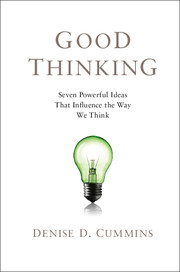Two - Game Theory
When you are not the Only One Choosing
Published online by Cambridge University Press: 05 June 2012
Summary
John and Mary are trying to decide how to spend their Friday evening. John prefers to stay in and play videogames. Mary prefers to go to a movie. But they both prefer to be together rather than apart. You can see the problem. Any way they choose, one or both will be unhappy. If they play videogames, John will be happy, but Mary will be bored. If they go to a movie, Mary will be happy, but John will be settling for his second choice. If they go their separate ways, both will be unhappy.
This is a much harder decision to make than it seems at first blush because each decision maker is not the only one choosing, and the outcome for each depends on what the other does, and they both know that. Let’s follow Mary and John a bit more.
It’s now Monday afternoon, and Mary is trying to avoid an annoying co-worker who keeps asking her out on a date even though he knows she’s married. There are only two places to eat near her workplace, Subway Sandwich Shop and Starbucks. If she goes to Subway, and the co-worker goes there as well, she won’t be able to avoid him. She will be miserable, but he will be delighted. The same thing will happen if they both end up at Starbucks. But if she goes to Subway, and he goes to Starbucks, she will be relieved, and he will be frustrated. Same thing if she goes to Starbucks, and he goes to Subway. So, once again, the outcome for each party depends on what the other person does, and they both know that.
- Type
- Chapter
- Information
- Good ThinkingSeven Powerful Ideas That Influence the Way We Think, pp. 5 - 30Publisher: Cambridge University PressPrint publication year: 2012



